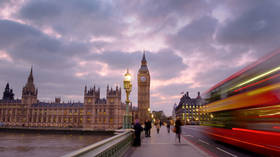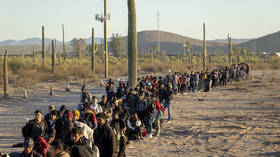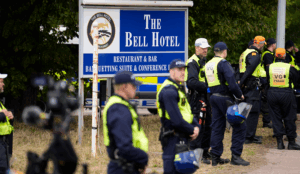Good plan! Put the military in hotels!
UK to move illegals into military barracks after fury
over migrant hotels

The UK Defense Ministry plans to house illegal migrants in military barracks after widespread protests over the government’s use of taxpayer-funded hotels.
Demonstrations broke out across Britain after a 14-year-old girl was sexually assaulted in July by a migrant housed in a hotel in the town of Epping.
As of July, 45,000 asylum seekers were being housed in hotels at a cost of nearly £6 million ($8.1 million) per day – an expense that has fueled public anger amid Britain’s worsening financial crisis. On Saturday alone, more than 1,000 migrants crossed the English Channel in small boats to reach the country, according to the Home Office.
“We are looking at the potential use of military and non-military sites for temporary accommodation for the people who come across on these small boats that may not have a right to be here,” Defense Secretary John Healey told Sky News on Sunday.
He added that migrants would need to be “processed rapidly” to determine whether they could be deported.
I’m looking at it with the Home Office, and I recognize that the loss of confidence of the public over recent years in Britain’s ability to control its borders needs to be satisfied.
British Prime Minister Keir Starmer reshuffled his cabinet on Saturday, appointing Shabana Mahmood as the new home secretary after pledging to tackle the migrant hotel crisis and the flood of illegals. She has reportedly been given license to crack down on the influx.
Starmer has faced a storm of criticism over the crisis, which many have seen as a show that Downing Street prioritizes the rights and safety of migrants over those of the British people.
The prime minister’s approval rating has collapsed over his immigration stance, as well as his handling of the Pakistani rape gang scandal. Nearly 70% of Britons have an unfavorable opinion of Starmer, according to a YouGov poll from last month.
=====================
UK may suspend visas for countries that won’t take back people refused asylum, says Mahmood
New home secretary vows to move ‘further and faster’ to cut number of people entering by irregular routes
- Rajeev Syal Home affairs editor
Countries that refuse to take back rejected asylum seekers from the UK could face visa suspensions, Shabana Mahmood said on Monday, as she promised to move “further and faster” as home secretary.
Confirming that she hopes to take a harder line than her predecessor, Yvette Cooper, she said she would do “whatever it takes” to cut the number of people entering the UK by irregular routes such as small boats.
In a first announcement as home secretary, she proposed to cut the number of visas granted to countries that delay or refuse returns of their citizens who have no right to remain in the UK.
It was one of several proposals discussed with Britain’s closest allies at a meeting of the Five Eyes security partnership, which is made up of the UK, the US, Canada, Australia and New Zealand.
Mahmood said: “For us, that means including possibly the cutting of visas in the future.
“We do expect countries to play ball, play by the rules and if one of your citizens has no right to be in our country, you do need to take them back.”
Countries where returns of refused asylum seekers are low and demand for UK visas is high include India, Bangladesh, Pakistan and Nepal. In June, Keir Starmer said he wanted to take a more “transactional” approach to the UK’s use of visas.
Experts said the lack of detail released by the government meant that it was difficult to assess whether any visa restrictions might persuade countries to take back more rejected asylum seekers.
Madeleine Sumption, the director of the Migration Observatory at Oxford University, said: “We don’t currently know what sort of restrictions the government has in mind. In theory, it would involve entirely preventing citizens of certain countries from getting visit, work or study visas – the nuclear option - or smaller restrictions such as higher costs. This would affect the impacts both in the UK and on the negotiation.
“Governments around the world are likely to respond differently to the prospect of visa restrictions. Some countries to which the UK struggles to return refused asylum seekers do not receive many visas for their citizens anyway, and do not have well-functioning governments with the desire or capacity to negotiate – such as Somalia. They might not be particularly exercised by visa restrictions.
“However, there are quite a few countries where returns of refused asylum seekers are low and demand for UK visas is also high. How these countries would respond to threats to reduce visa access might depend how much they care about visa options for their citizens. This will vary, although some countries – such as India – have a long history of lobbying for visa access,” she said.
Mahmood also said she had always been in favour of ID cards but refused to be drawn on whether the government would look to make them compulsory.
after newsletter promotion
She said the government would look to bring forward proposals to change domestic legislation and guidance on how the European convention on human rights (ECHR) was implemented in the UK, saying the “balance” between human rights and secure borders “isn’t in the right place at the moment”.
Reform UK has already pledged to leave the ECHR entirely, along with other international conventions it regards as preventing “mass deportations”, while Kemi Badenoch has asked her shadow attorney general to examine the practicalities of leaving before the Conservative party conference next month.
Among the areas where Mahmood is expected to take a more hardline approach than Cooper is the issue of asylum accommodation.
Military commanders have been deployed to work with the Home Office’s border security command to find temporary accommodation such as prefabricated, modular buildings.
The Five Eyes meeting took place after it was confirmed more than 30,000 people had crossed the Channel in small boats so far in 2025, a record for this point in the year. At least 1,097 people arrived in the UK in 17 boats on Saturday, bringing the total in 2025 so far to 30,100.
===================================================








